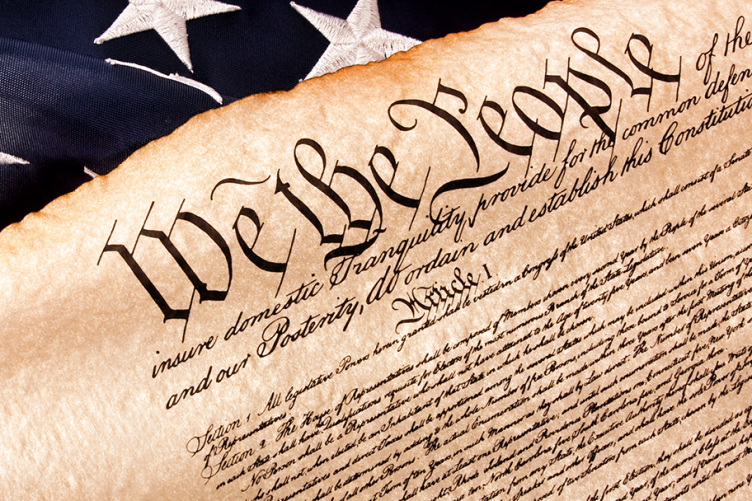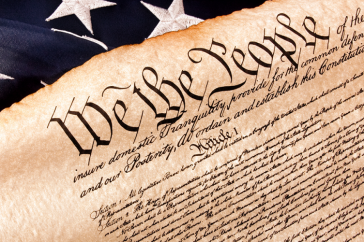
Every year, schools and government agencies join the nation in observing Constitution Day and Citizenship Day the week before and after Sept. 17, the anniversary of the signing of the Constitution. Federal courts participate by offering educational resources and experiences in their communities. Below, UNH associate professor of political science Susan Siggelakis reflects on the Constitution and Common Law claims.
Do you ever get spam texts or robo calls? Of course you do. Does it bother you? Probably a little bit now and again. Mostly you ignore them. You might not know it, but under the Anglo-American system of common law, you have a right to be left alone, which is termed the right of seclusion. Common law is the set of liberties that emerged in the Middle Ages in England, as judges deciding cases around the realm sought to resolve disputes among its people without the benefit of having had the Parliament set down a written rule about it. Over time, judges drew on the decision of other judges throughout the realm and the various solutions to legal disputes thus became ‘common.’ Introverts like me are happy to know about this right, but how do you get those companies to respect it? In other words, how does one go about effectuating your right? As French nobleman Alexis De Tocqueville long ago pointed out, sooner or later, every important issue in American society tends to end up in the courts of law.
Do you have a right to sue in federal courts those telecommunications and other companies that are violating your seclusion, even if you have incurred no harm beyond a moment’s annoyance? If so, they could be held liable and have to pay restitution. Traditional legal doctrine, which is derived from Article III of the United States Constitution, would imply that you don’t have the right to haul them into court. Article III makes the judicial branch one of the three co-equal branches of government, true. Yet, the Framers of the Constitution wanted to separate and delineate the powers of each of these branches, leaving to each only the types of powers it could and should legitimately accomplish in a representative democracy. Congress should vote on whether to impose taxes, not unelected judges, for example. Thus the federal courts are courts of limited jurisdiction; i.e. they can only decide the types of cases that they are authorized to do by the U.S. Constitution and the Congress. In addition, the justices themselves, drawing on Article III over the past 230 or so years, have set their own standards for what is called ‘justiciability,’ which are the characteristics a case or litigant must have in order to gain access to the federal court. One of the most important of these is called standing, a requirement derived from Article III that, only ‘cases and controversies’ are appropriate for judicial determination. To establish standing, a person who hopes to file a case in federal court must satisfy three procedural prongs before the substantive case can ever be heard. These are that: 1) that person has suffered an alleged concrete and particularized injury to a legally vested right or interest 2) that is traceable to the defendant’s conduct 3) and that can be redressed by a favorable judicial decision. (Somewhat confusingly, when Congress passes a statute it sometimes confers standing on individuals, companies or governmental bodies, which is easier to establish than Article III standing).
Back to Article III and its three requirements…. is that moment of annoyance you felt really a concrete injury or something more abstract? Did you lose any of your money, property or your physical health as a result of it? Did you lose your ability to hold a job or form quality relationships? No. A federal trial court in Ohio recently heard a similar type of case involving an unsolicited electronic communication and, construing Article III, denied that plaintiff standing because it saw no injury allegedly imposed on the plaintiff. The case was dismissed.
However, the person who had unsuccessfully brought that case, Matthew Dickson, appealed to The United States Court of Appeals for the 6th Circuit (one of federal courts directly below the U.S. Supreme Court and directly above the trial court that had heard the case). That court, disagreeing with the court below, ruled in 2023 that Dickson absolutely DID have standing: i.e. he had satisfied the three-prong requirements and said so in Dickson v. Direct Energy, LP; Total Marketing Concepts, Inc.; Silverman Enterprises. It did not dispute the fact Dickson had received only ONE ringless voicemail (RVM) that he did not even look at or listen to until long after it came to his phone. In fact, Dickson never even asserted that he had been interrupted in any activity, such as eating dinner with his family, when the RVM came in. Nevertheless, this appellate court found that Dickson was wrongly denied his ability to even try to make the case at the trial court that his right of seclusion had been violated. In deciding this case, a three-judge panel relied primarily on a different (7th Circuit) Court of Appeals decision authored in 2020 by Judge Amy Coney Barrett, prior to her elevation to the U.S. Supreme Court. In this case, Gadelhak v. AT &T Services, Inc., Barrett recognized that even alleged, minimal intrusions could satisfy standing requirements. In her view, the degree of harm did not matter. What did matter was the kind of intrusion and, she noted specifically that this kind of corporate behavior had previously inspired Congress to pass the Telephone Consumer Protection Act (TCPA) in 1991. In that act, Congress had specifically authorized citizens to sue companies who employed marketing tactics (unsolicited phone calls) similar in kind to Direct Energy’s RVMs. Even those who had gotten only one annoying telephone call could sue under the TCPA! Thus, the 6th Circuit Court of Appeals applied Barrett’s reasoning from a 7th Circuit case, allowing Dickson to have his case reheard in the federal trial court.
In both judicial circuits, we can see plainly how Congressional statutes passed under different circumstances can actually affect how federal judges construe and apply constitutional, procedural requirements when dealing with common law claims. Whether Dickson will win this case on the merits, (i.e. was his right of seclusion actually, not just allegedly, violated?) is up in the air. But at least he is allowed his day in federal court, thanks to the 6th Circuit’s interpretation of Article III standing.
















































